Foods that trigger afternoon fatigue
At 3 p.m. on the dot, your eyes start to feel heavy, body posture sinks down, and your head nods back and forth. You’re suddenly overcome by a feeling of fatigue and grogginess. This is afternoon fatigue.
It’s no surprise this afternoon slump sets in after lunch. According to the National Sleep Foundation, the body’s circadian rhythm dips and rises at different times of the day. This may prompt you to “take a nap” between 1:00-3:00 p.m., but it varies by person. Rachel Fine, RD, a registered dietitian nutritionist and owner of the nutrition counseling firm To The Pointe Nutrition in Roslyn, New York, explains why eating an energy-fueled lunch can help you avoid the afternoon crash.
“Eating lunch keeps your body fueled and your metabolism active. When we fuel our body, we avoid dips in energy that lead to an afternoon of sluggishness and cravings,” says Fine. (By the way, here’s what different cravings can reveal about your health.)
It’s also important for your lunch to be rich in nutrients. Afternoon Fatigue: 9 Lunch Foods That Can Drain Your Energy, says Rania Batayneh, MPH, a nutritionist, owner of Essential Nutrition For You in Beaverton, Oregon, and author of The One One One Diet: The Simple 1:1:1 Formula for Fast and Sustained Weight Loss.
“Ideally, your lunch should have a healthy mix of complex carbohydrates for sustained energy, plus protein and healthy fats for satiety. Add some non-starchy vegetables for bulk and fiber,” says Batayneh.
Now, here are the 9 foods to avoid to prevent falling into an afternoon slump.
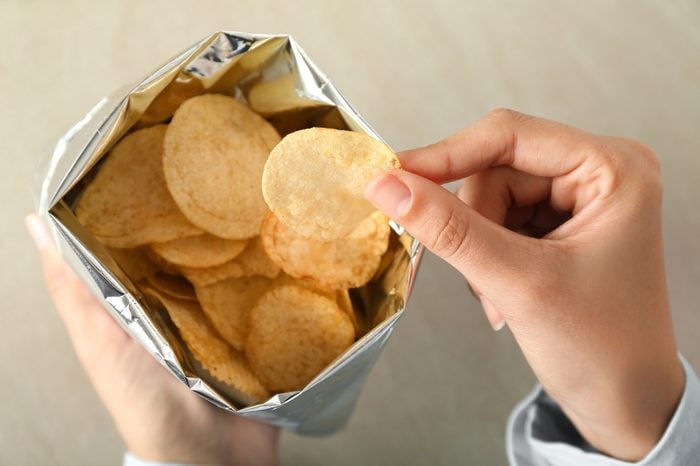
Potatoes (chips, french fries)
Any salad or sandwich can be made a meal with a drink and a bag of chips or french fries. But, it’s best to skip both of those sides. Not only has intake of fried potatoes been linked to hypertension in a 2016 study in the British Medical Journal (BMJ), but they also can be high in fat and low in energy-sustaining protein.
“While there isn’t an ideal macronutrient ratio for everyone—endurance athletes or individuals who are very active might need more carbohydrates, while those who lift weights often might need a little more protein—high-carb diets tend to make you sleepier,” Batayneh says. “After you eat carbs, your blood sugar levels increase; as a result, your body releases insulin to shuttle those sugars from your bloodstream into your cells.” This can trigger afternoon fatigue. Eat too many fast-digesting carbs, like fries or chips, and the resulting spike and fall in blood sugar will likely make you feel ready for naptime.
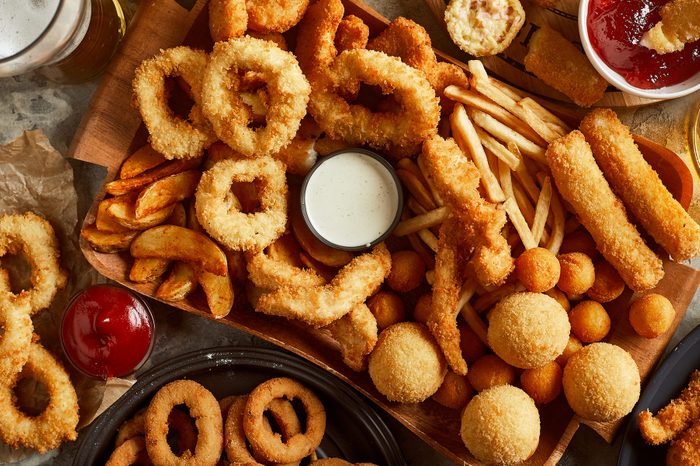
Fried foods
Just like french fries, you should also steer clear of the mozzarella sticks, chicken tenders, and egg rolls, too. “Fried food can make you feel sluggish due to the high-fat nature of the meal, which requires a bit more time to digest,” Fine says. Fat is a challenge for the body to break down, adds Batayneh, “so your body spends more energy on their digestion, which can leave you feeling low in energy.” (Not to mention a 2019 study in the BMJ has found a link between eating more fried foods with a shorter lifespan.)
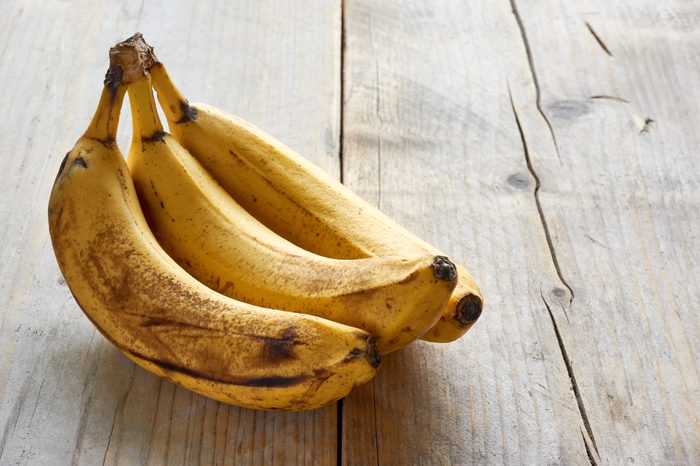
Bananas
This fruit contains high levels of potassium, but “bananas contain L-tryptophan, which is converted to 5-HTP in the brain, which is then converted into the hormones serotonin and melatonin,” Batayneh says. While serotonin can boost your mood, melatonin regulates your internal clock and can make you feel sleepy, according to The National Sleep Foundation.
Pair bananas with a handful of nuts, spreading it with nut or seed butter, suggests Fine. Or, slice and serve the fruit in a cup, she says. Add a scoop of Greek yogurt to avoid a blood sugar spike.
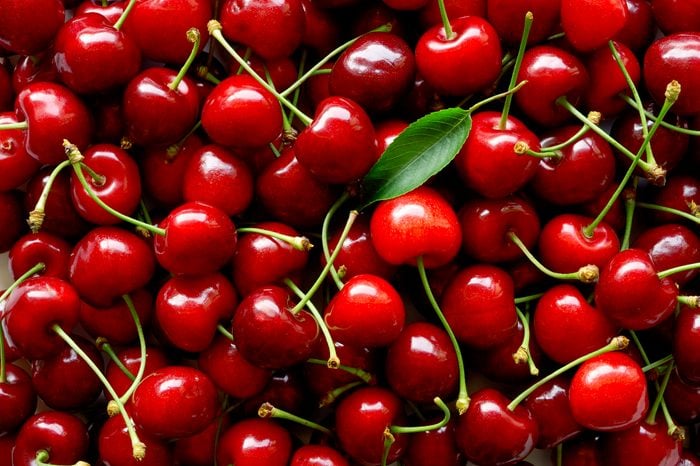
Cherries
The ruby-red fruit is high in melatonin, the “sleep hormone,” which can induce sleep. “Consider saving your sweet cherries for later in the day, to combat the potential of afternoon fatigue early on,” Fine says. (And in the meantime, check out 50 easy ways to get more energy.) Also, skip on the cherry juice: According to a 2019 study in the journal Nutrients, it also contains enough melatonin to promote sleep—not exactly what you want during the middle of a busy day.
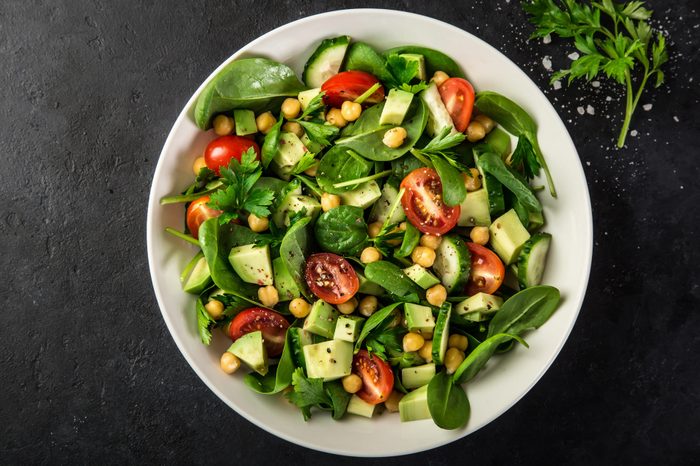
Salad
Green salad (adorned with dressing) can be among one of the lunch foods that trigger afternoon fatigue. “Almost all foods can cause fatigue if not eaten as a balanced meal or snack,” Fine says. Salads that topped with dressing can contain copious amounts of sugar. A quarter-cup of Russian dressing, for example, packs in 10 ½ grams of sugar, according to the USDA’s FoodData Central nutrition database. That’s almost a full tablespoon, not counting what might be hiding in any candied nuts or seeds.
For a salad that will actually sustain, make your own low-sugar dressing, and ensure you add enough—but not too much—protein. (About 25 grams of protein per meal is all your body can utilize at once, suggests a 2018 study in the Journal of the International Society of Sports Nutrition.
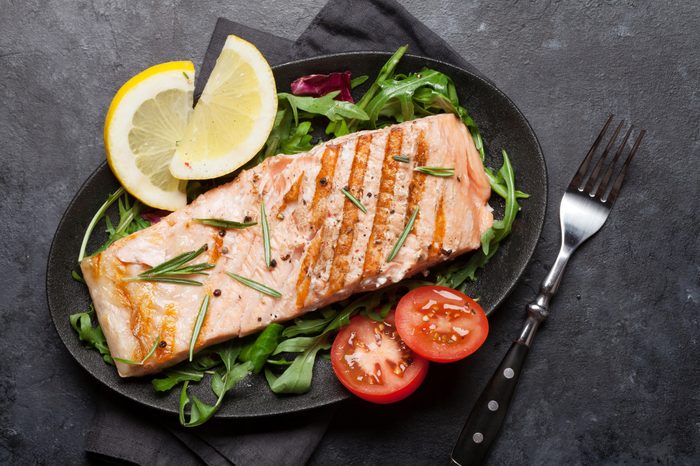
Salmon
Rich in heart-healthy omega-3 fats and many good-for-you vitamins, salmon seems like a total catch for lunch. Although it’s high in protein, which will keep you full, salmon is loaded with vitamin B6, which triggers the body to produce melatonin—that sleepy-time hormone, according to the American Sleep Association. Don’t skip the seafood entirely, though, our health experts recommend. Just save the seafood for dinner, if possible.
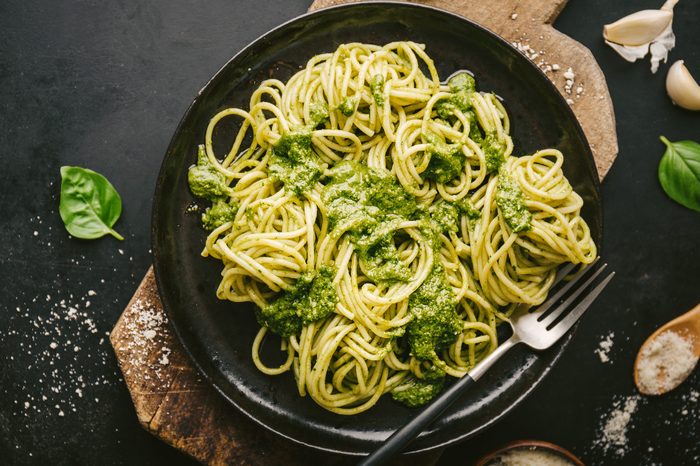
Pasta
Indulging in a big bowl of bowtie noodles before an early afternoon meeting can leave you feeling lethargic. Pasta that’s low in fiber and not paired with protein can spike your blood sugar before a big crash. This is done in a similar way as potatoes as previously mentioned. “Pasta can leave you tired due to the surge in insulin that follows a carb-heavy meal,” Fine says.
But if you’re really in the mood for manicotti, “choose a higher-fiber pasta like lentil-based varieties, or simply add a protein source to any standard pasta entree to create a more sustainable effect on energy,” Find adds. (Score 6 more strategies to eat a high-protein lunch.)
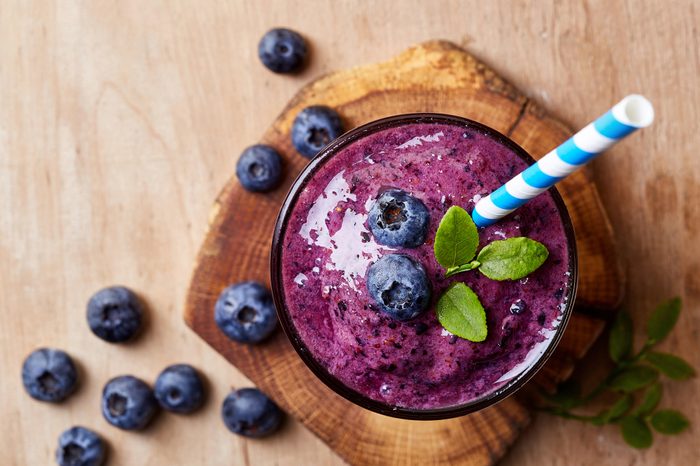
Sugary smoothies
High in added sugar by way of honey, agave, yogurt, or other sweeteners, a large strawberry smoothie can pack in 610 calories, 154 grams of carbs, and 104 grams of added sugars. (That translates to 7 tablespoons of sugar.) “You want to focus on a balance of all macronutrients—carbs, protein, and fat. The addition of fat, protein, and fiber will extend the immediate energy you get from carbs,” Fine says. “Relying solely on simple carbs, such as fruit and foods high in added sugar, can leave you feeling sluggish if not properly balanced.”
Instead of drinking your calories, choose complex carbs high in naturally-occurring fiber to reap the benefits of lasting energy. These include lentils, black beans, chia seeds, barley, among many others. Loading up on these foods can help curb afternoon fatigue.
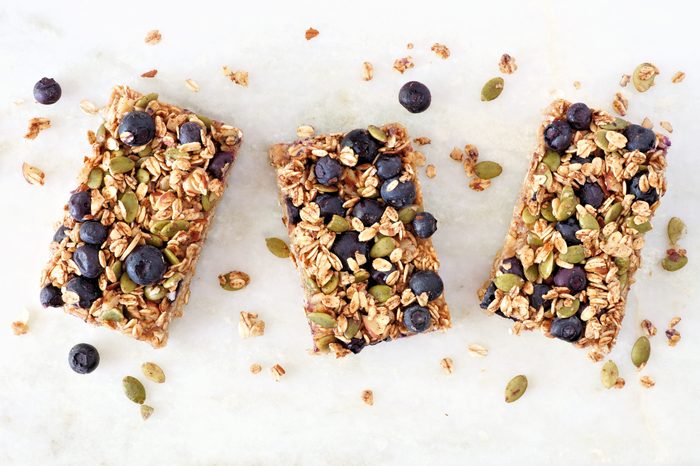
Energy bars
While these can be an okay meal replacement, many energy or protein bars are candy bars in disguise. They’re low in carbs and high in protein, but they can also be high in sugars or artificial sweeteners. “Carbs are our body’s primary fuel source. Though technically carbs, an excess in added sugar can result in a blood sugar spike, which would be shortly followed by a dip in blood sugar as the body releases a surge of insulin to counter the sugar overload,” Fine says.
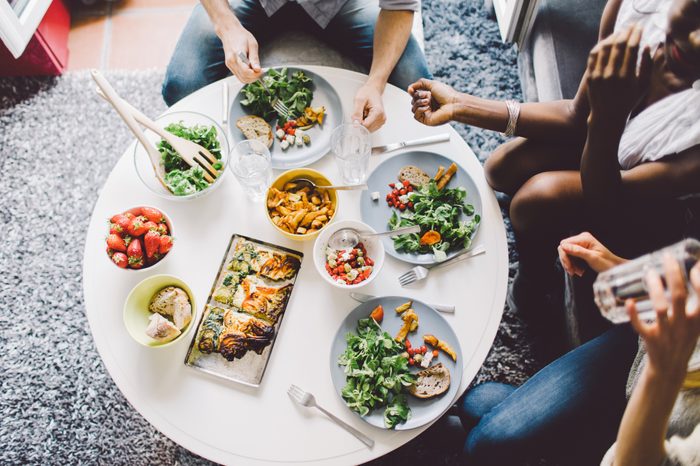
Eating too much or too little
Chowing down on too many or too few calories from any food might be the biggest—and most common—lunchtime fatigue mistake. To process food more efficiently, the body will divert energy from the brain to your digestive system. This happens when you overeat.
“If you’re not eating enough protein, carbs, and fat you may simply not be eating enough calories—and calories are energy,” says Batayneh.
While you won’t become vitamin deficient from just one low-nutrient meal, micronutrients help your body to function optimally. Fatigue, especially in the afternoon, can arise when regularly skimping out on micronutrients from whole food sources, she adds.
For sustained energy and blood sugar, every meal should be balanced with one serving of protein, one serving of carbohydrate, and one serving of fat. This can also decrease cravings and overeating, says Batayneh. If possible, include vitamins and minerals like iron, zinc, and B vitamins (Fine suggests whole grains, produce, and legumes) to keep your metabolism humming and to avoid early-onset fatigue.
